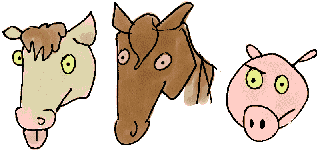 | ||
 | ||
Manure
Animal manure, more commonly called poop, dung, or quite a few other things, is great for the garden. It's not high in nutrients, but it increases a plant's ability to absorb and use what's available over a longer period of time. This makes it a very effective fertilizer. It's usually inexpensive too, if you know a farmer with cows, sheep, horses, or pigs who may have a whole pile of it with your name on it! Animal manure is affected by many factors:
Manure loses 60% of its nutrients in less than 6 months if it's left outside, uncovered, but it is still a good soil conditioner. 
Don't use manure from animals that have eaten meat. It becomes too acidic for plants and smells really, really, really bad. That's why we don't use pet dung on our gardens... we've all seen what it can do to a lawn! Most manure contains weed seeds, so be sure to mulch your garden well so they don't get a chance to grow in your vegetable and flower gardens. Caution: when using manure that has sawdust or wood shavings in it, you may need to add nitrogen to the soil. Fascinating Facts!
| ||
| ||